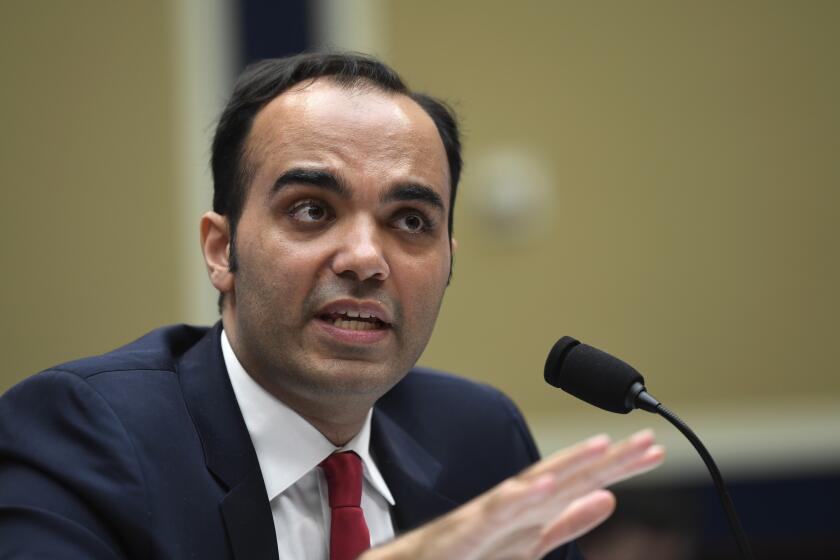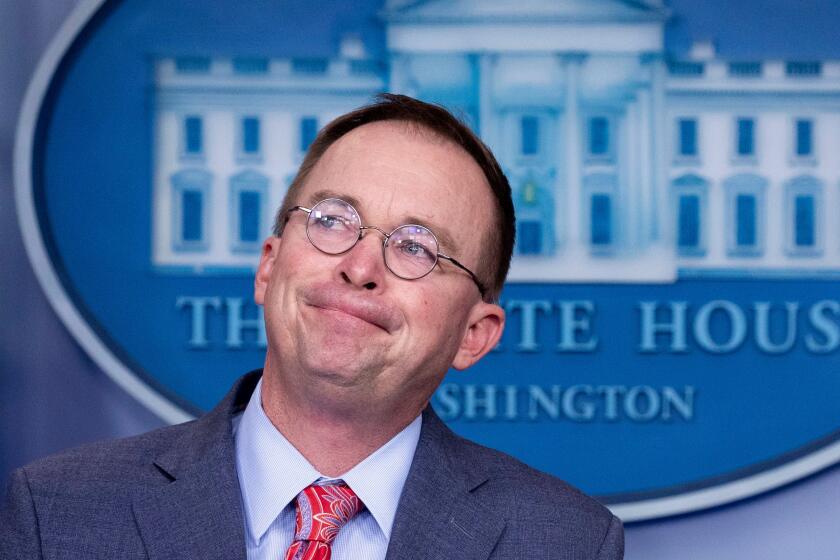Column: Federal regulators step up their campaign against predatory payday lenders and their rip-offs

- Share via
In 2017, the federal government was poised to give low-income consumers a respite from the myriad abuses and rip-offs visited on them by the payday lending industry.
The Consumer Financial Protection Bureau, created in 2010 as part of the banking reforms enacted after the 2008 financial meltdown, had completed a five-year project to finalize a rule that would prevent payday and installment lenders from predatory practices such as enticing borrowers into loans they couldn’t afford while extracting a vigorish that would make a Mafia loan shark blush.
Then Donald Trump happened. As president, he installed Mick Mulvaney, his budget director and a former Republican congressman from North Carolina, as the bureau’s acting director. Mulvaney effectively canceled the new rule on Jan. 16, 2018, the day it was to go into effect.
A payday advance that is repaid on payday is a payday loan, and fintech cash advance apps that call themselves ‘earned wage access’ are just high-cost lending in disguise.
— Lauren Saunders, National Consumer Law Center
Two days later, Mulvaney withdrew a lawsuit in Kansas state court that had charged four lenders with saddling borrowers with annual interest rates as high as 950%. And he closed an investigation into a lender that had contributed to his political campaign.
In the words of Sen. Elizabeth Warren (D-Mass.) — who had pushed for the creation of the CFPB — these actions “unwound years of careful CFPB work — all to benefit an industry that has close ties to Mr. Mulvaney and that has contributed more than $60,000 to his political campaigns.”
Get the latest from Michael Hiltzik
Commentary on economics and more from a Pulitzer Prize winner.
You may occasionally receive promotional content from the Los Angeles Times.
Mulvaney, absurdly, redirected the agency away from its purpose of consumer protection: “We work for the people,” he told its employees. “And that means everyone: those who use credit cards, and those who provide those cards; those who take loans, and those who make them; those who buy cars, and those who sell them.”
In other words, the CFPB would be protecting not only consumers but those who take advantage of consumers.
It now looks as if the cop is back on the beat. On July 18, the bureau proposed a new rule making clear that payday advances are loans within the definition of the federal Truth in Lending Act, meaning that companies have to fully disclose all the costs and fees to borrowers — before the borrowers sign any loan documents.
“When interest rates and fees on these loans are high, this can lead to a treadmill of debt that keeps getting faster and faster,” CFPB Director Rohit Chopra said in announcing the new rule.
The bureau also has returned to court. On May 17, it sued L.A.-based lending marketplace SoLo Funds in federal court in Los Angeles, asserting that the firm’s “advertising and disclosures ... falsely tout no-interest loans when, in fact, consumers are routinely subject to fees that result in an exorbitant total cost of credit.” When the fees are toted up, the agency says, the true annualized interest rate on the loans can be more than 300%.
The banking industry hates Consumer Financial Protection Bureau Director Rohit Chopra because he’s on the side of banking customers.
SoLo hasn’t yet responded to the allegations in court and didn’t reply to my emailed request for comment.
The bureau has been energized in part by a Supreme Court decision that lifted a shadow over its future. This was a lawsuit brought by some of the targeted lenders contending that the bureau was unconstitutional because it was funded by the Federal Reserve System rather than through congressional appropriations.
Several pending CFPB cases had been placed on hold while the Supreme Court pondered the appropriations issue. But the court ruled in the CFPB’s favor on May 16 in a 7-2 decision written by Justice Clarence Thomas.
Among those cases was a federal lawsuit the bureau filed in July 2022 against Texas-based ACE Cash Express, which then operated out of nearly 1,000 storefronts in 22 states, including California. The CFPB charged that when ACE borrowers said they were unable to pay back their existing loans, ACE offered them repayment plans bearing new fees but sometimes didn’t tell them a no-fee option was available in some states.
ACE already was subject to a 2014 consent order in which it agreed to pay a $5-million penalty and $5 million in customer restitution, and pledged to offer customers a refinancing of their loans as well as the free option. “ACE has not done as it pledged,” the CFPB charged in its lawsuit.
ACE responded to the lawsuit by citing the case then headed to the Supreme Court. “The days of the Bureau’s unchecked administrative agency power ... are, hopefully, over,” its lawyers wrote. “Because the CFPB itself is unconstitutional,” the case should be dismissed, they argued. The trial court put the case on hold, but with the Supreme Court ruling, the case is back on the docket, with briefs due at the trial court over the next two months.
The Supreme Court ruling was long overdue. In the years since Mulvaney tore up the CFPB’s project against payday and installment lenders, that industry underwent a troubling transformation.
Once operating out of storefronts where customers could cash their paychecks for a fee, it had grown more sophisticated. Customers could now take loans as advances on their paychecks but typically had to provide the lenders with links to their bank accounts so that repayments could be drawn directly from those accounts.
Staff members at CBS News are in an uproar over the news department’s hiring of former Trump White House chief of staff Mick Mulvaney. With good reason.
The industry now styled its products as “earned wage access” providers. The firms today have innocuous, homely names such as Dave.com and Brigit; their websites are adorned with stock photos of young people and families evidently basking in the relief of a short-term financial crisis averted. Some claim to charge zero interest on their short-term loans, but that’s misleading.
One should respect the financial tightrope walked by many low-wage households living paycheck to paycheck. The CFPB knows this market; its proposed rule acknowledges that “a significant driver of demand for consumer credit ... derives from the mismatch between when a family receives income and when a family must make payments for expenses.” Meanwhile, “employers have a strong incentive to delay the payment of compensation to workers, which drives demand for short-term credit.”
When the true cost of that credit is hidden from the borrowers or they’re forced to refinance, incurring multiple fees, that’s a problem the CFPB was born to address.
“A payday advance that is repaid on payday is a payday loan, and fintech cash advance apps that call themselves ‘earned wage access’ are just high-cost lending in disguise,” Lauren Saunders, associate director of the National Consumer Law Center, says on the center’s website. “The CFPB has seen through fintech payday lenders’ new clothes.”
Some firms have made deals with employers such as Walmart, Amazon, Uber, Lyft and Kroger to provide advances to workers to be repaid from their next paycheck. In 2022, the CFPB says, more than 7 million workers accessed about $22 billion via these employer-lender partnerships. According to a survey cited by the bureau, most users of paycheck advance services fall below the federal poverty line and more than 80% are hourly or gig workers.
The chief constant tying the new system to the old is fees. About 90% of workers paid a fee for the advances in 2022, averaging about $3.18 per transaction. Since most took out repeated advances, the average annual cost was almost $69.
The CFPB found that among the fees most prevalent in the wage-advance sector are those charged for “expedited” access to cash — which after all is the goal of resorting to paycheck advances in the first place.
But new kinds of fees have appeared. One is often described by the finance firms as “tips” — solicited from borrowers in acknowledgment of the service they’re being provided or to defray the cost the firms ostensibly incur by lending out at 0%.
Los Angeles U.S. District Judge John F.
Those are among the issues in the CFPB’s lawsuit against SoLo. The firm functions as a sort of loan broker — needy customers apply for loans, and other customers provide the loans after judging an applicant’s creditworthiness. (“Earn money with your money,” SoLo tells these small-money lenders on its website. “You lend money to other members to help them replace a tire, cover a bill or for any other reason. They pay you back and add a voluntary tip as a sign of appreciation.”)
The maximum loan is $575. Borrowers can set a repayment date that is less than a month away; if repayment isn’t made after 35 days, the bureau says, SoLo charges a late fee.
The CFPB says the tips aren’t really “voluntary” at all; lenders tend to judge loan applications based on the size of the “tip” being offered, as SoLo suggests. SoLo also prompts applicants to select among three default “donation” fees that go directly to the firm.
None of the defaults is for $0, and borrowers can’t click to the next page without making a choice. Customers can opt for a $0 donation, but only by finding the option in another part of SoLo’s mobile app as though by accident.
“Virtually all consumers who receive loans incur a Lender tip fee, a Solo donation fee, or both,” the CFPB alleges.
It’s proper to note that this isn’t SoLo’s first rodeo. Last year, the California Department of Financial Protection and Innovation reached a consent agreement with the firm over some of the same practices targeted by the CFPB; SoLo paid a penalty of $50,000 and committed to reimbursing its California customers for their “donations.”
Also last year the District of Columbia settled its own case against SoLo, in which it alleged that despite advertising no-interest, no-fee loans, the firm compelled “nearly all borrowers to provide monetary ‘tips’ and ‘donations’” that effectively drove up the annualized interest rates to more than 500%, well beyond the district’s 24% usury limit. SoLo paid a $30,000 penalty and pledged that lenders would no longer be able to know that a borrower had offered a tip or how much it would be.
And in 2022, Connecticut authorities imposed a $100,000 penalty on SoLo and required it to reimburse Connecticut customers for all “tips,” “donations,” late fees and other charges. SoLo was barred from the lending business in that state without obtaining any required license.
The battle against predatory lending to small borrowers isn’t over. Project 2025, the right-wing document designed as a manifesto of the Trump presidential campaign, has targeted the CFPB for extermination, calling it “a highly politicized, damaging, and utterly unaccountable federal agency.” The manifesto says “the next conservative President should order the immediate dissolution of the agency.”
(The document was written before the Supreme Court ruled in the CFPB’s favor, so it takes the agency’s unconstitutionality as gospel.)
The specter of rampant Mulvaneyism still lurks on the horizon in a Republican administration: taking government off the backs of the people, so predatory businesses can again saddle up.
More to Read
Get the latest from Michael Hiltzik
Commentary on economics and more from a Pulitzer Prize winner.
You may occasionally receive promotional content from the Los Angeles Times.














